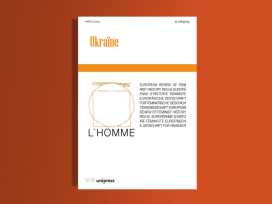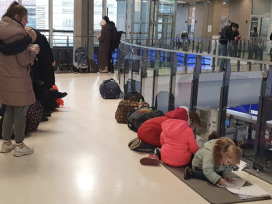Fluid citizenship
After almost half a century of socialist state policy replacing rights by privileges and making migration from village to city a powerful instrument of domination, countries like Bulgaria have found themselves in the complex geometry of the EU. Around two million persons a year of a population of seven million are in permanent motion, working abroad, studying, coming back, investing, leaving again. This trend towards overcoming arbitrary socio-political spaces is most evident in the Internet’s utopian horizon of absolute mobility. But is the downside to this utopia a loss of public spirit?
Mobility as evasion
The utopia of cosmopolitanism, multiculturalism, and mobility brought about by the liberalization of the Soviet bloc during the 1980s, which climaxed with the collapse of communism, to a great extent legitimated the process of the destruction of the state. However the energy that fuelled this process was ambiguous: there was both the wish among citizens of the Soviet bloc to change conditions at home and establish a better society, and the wish to leave and change one’s life immediately. I suggest the term “citizenship pressure” to describe this ambiguity. This pressure holds power at bay and pushes for reforms until they have been made, at which point people are able to leave, pressure is released, and the will to change fades.
Labour migration in the Soviet bloc during socialism was restricted to highly qualified specialists – doctors, engineers, teachers, and construction workers. They were exported to Arab and other third world countries, with the state receiving over half their salaries. After the collapse of the regime, the situation slowly returned to “normal”; Soviet bloc countries became a source mainly of low-level labour.1 The 1990s were the period of transition between these two emigration regimes. A large number of qualified persons, many no longer young, were taken by the emigration panic, not understanding that the world had changed. A Bulgarian joke of those days went that “Only adventurers stay home”.
The newly acquired freedom of movement has abolished the existential aspect of the socio-political space one inhabits: any social or political problem can be solved, on an individual basis, by flight. Zygmunt Bauman has called this state “Liquid modernity”, pointing out that power no longer operates through coercion and conflict, but through avoidance and evasion. 2 To recall the famous dictum by the British economist Joan Robinson: “There is one thing worse than being exploited – not being exploited”. In the new global arrangement, the biggest threat is that power will exit and leave behind chaos.
The same applies to citizens themselves. Citizenship, one might say, operates through avoidance and evasion. Would this imply a new form of democracy, where power tries to attract human flows, such as occurs with clients in the market place? Where political science operates with concepts such as speed of circulation, viscosity, stagnation, or overspill?
Of course, opening up of socio-political spaces is not just a political phenomenon linked to control points and visas. Leaving home and integrating elsewhere has become easier during recent decades. In the First World, the cultural invariant granting locals various privileges over newcomers has been challenged, if not in practice, at least in legislation, and within the soft ideology of the global world. The Second and Third Worlds have been under pressure to abolish such practices. What is new is not the phenomenon itself, but its ideological normalization. Supposedly, persons have the right not only to move, but also to bring their cultural context, their language, rituals, and lifestyles with them.
Global utopia as cosmopolitan belonging has been incarnated by a handful of nomad intellectuals, politicians, or businesspersons who feel at home anywhere and who have developed a specific international culture (kissing hello, eating ethnic food, pre-googling their interlocutors, asking the taxi driver for local information). The problem is that these privileged faces of globalization hide the reality of ever increasing mobility. The average migrant is not freer, but more docile.
Interviews I have conducted with Bulgarian migrants in France and Turkey over the last ten years have shown that they rarely participate in political processes in the host country even when they become naturalized. If at all, migrants tend to be fascinated by extreme parties who promise to stop immigration (lack of solidarity seems to be a sign of marginality). Emigration lowers “the ceiling of citizenship”: migrants are less interested in the country they enter. This ceiling was already low under socialism; Sheila Fitzpatrick has shown that under that system the only citizen activity permitted was that linked to consumer practices, such as indignation at a waiter or shop assistant, or complaints about a faulty article.3
Most migrants I have met live in a temporary world; the main vision they have of the future is to return once they have received their pension or made money. The reason is simple: home is where they are able to taste the success for which they have paid so dearly. Bulgarians will look upon them, and the miserable pension they earned in the Europe, with envy and admiration. Another frequent reason to return is the wish to be buried “at home”. The temporariness of the migrant’s status can of course be heard in the unfortunate term Gastarbeiter. In the post-Ottoman region, the gurbet is a temporary (originally male) form of labour migration under strict community regulations. Some interviewees have compared the new gurbet to going to the army. Sometimes they get the “black stamp” on their passport, bribe an official, change a letter in the transcription of their names to fool the Schengen computer system, leave again, and so on. Those people have no rights abroad, and no labour at home – they are the ideal human material of the new social order.
Though migrants lose – voluntarily for the majority – their rights as citizens, they are not completely deprived of social resources. The migrant has a nephew somewhere, knows someone from the same village, or at least a Serbian or a Turkish go-between who can present him to an employer. The personal or ethnic link is a guarantee of confidentiality (say, in case of non-declared payment). Rights are, in theory, universal; a position within the social network is always particular.
Historical parallels
Escaping to the New World has often been an outlet of citizen pressure in times of radical change. The privatization of land in Britain and the Poor Laws Amendment of 1834 (considered to be the real beginning of capitalism) prompted 2.5 million Irish to leave for America (of which up to 1.5 million starved to death). Would such dramatic changes, such as driving people off land that has been transformed into a commodity, have been possible without the outlet of emigration?
Communist modernization is a less known example of mobility- induced docility. Analyses of the communist regime tend to stress immobility, the sealing of borders, the absence of passports for peasants or the lishenzy, and so on. However, in the Soviet Union during the 1930s, as well as in places such as Bulgaria or China during the 1950s and 1960s, a massive rural exodus took place. In 1946, Bulgaria had an urban population of 24 per cent; in 1968, 50 per cent; and in 1989, 73 per cent. Such levels of urbanization resemble Great Britain at the height of industrialization.
Internal mobility during communism was conditional on official approval. People lured into the big cities not only by the better chances for work and development, but also by better supply, had to apply for permission to settle in the bigger cities (USSR – propiska, Bulgaria – jitelstvo, China – hukou). Resident permits were awarded in exactly the same way as developed countries award visas to immigrants today. In the 1960s, half of the migrants to Sofia received residence permits through marriage to a resident of Sofia; 34 per cent provided proof that they were needed for work in a company (the signature of the respective employer was needed); while some 16 per cent were elderly and were allowed to join their children in town in order to be looked after. The period before a permanent permit was issued was steadily raised, from 2, to 3, to 5 years in 1966; during this “trial period” the temporary resident could be sent back to his or her village. Some 11 per cent of the population of Sofia was in this situation during the 1960s. Of course, they were the most docile and performed the least attractive jobs. The bigger the internal migrant population, the better the regime’s chances of ensuring their submission; this was the case in Russia, Romania, Albania, and Bulgaria, and not in Czechoslovakia, Hungary, or the GDR, where urbanization had taken place before communism.4
Image-based citizenship
Let us now attempt to imagine a world on the move, where migration is no longer a one-way trajectory from village to town, from small to large, from temporary to permanent. A world where there are no longer stable jobs, definite professions, or long-term strategies, where temporariness is accepted as a state of being.
Gilles Deleuze’s and Felix Guattari’s concept of “deterritorialization” implies the disappearance of indexical signification (a local knows this cloud means rain); “reterritorialization” is performed through the image (a the painting of the cloudy sky of home).5 We might say that mobile people lose their rootedness in the indexical world of local knowledge and cultural competence and seek reterritorialization at the level of the imaginary. Such image-based reterritorialization could be said to produce a “citizenship of images”. It operates in two ways, according to the type of migrant.
First, there are the “superior” migrants, who have a command of the social, cultural, and linguistic skills that help them get along, at last partially, on their own. Then there are the “inferior” migrants who rely entirely on ethnic, neighbourhood, or friendship networks. Because the citizenship culture in the host countries is usually better developed, the superior migrants receive legal status and thus acquire a new sense of their rights. This sometimes results in the creation of associations, in the publication of newspapers and, of course, in feverish web-activity. The effort of integration, initial rejection by the locals, and the relative loss of social status brings about an over-valorization of “home”. The homeland is idealized and the migrant’s place in it is overvalued, resulting in what Benedict Anderson has called “long distance nationalism” – nationalism that is much more passionate than any in the homeland itself.6 Reterritorialization is performed by images of home within the alien context of the host country. Curiously, superior immigrants tend to transpose the rights their new residence or nationality gives them onto the de-contextualized images of the home country. What follows is a discourse of complaint about how bad things are in the home country and how well life is organized in the “civilized” (“developed”, “normal”) countries. Image-based citizenship travels back to the home country, where it is internalized, creating the omnipresent feeling of inferiority that accompanies modernization at the periphery.
“Inferior” migrants must periodically spend some time in their home country because of their insecure status. During the periods in which they are in the host country, they live four to a room and spare every penny they earn, minimizing contact with the locals. The ceiling of citizenship is lowered to the utmost, omitting all notions of political or social rights, and retaining only a vague notion of human rights, expressed in terms of honour.
What remains, and is essential to self-awareness, is “consumer citizenship”. The driving force for this type of mobility is the promise of consumption. This promise makes hardship and humiliation bearable. But the ideal of consumption is not so much created through indexical signs (buying this product makes me part of this or that social strata), but through images of “abroad” in which an entire world of consumption is reconstructed and the self projected upon it. This imaginary scene of consumption is carried around and can reterritorialize the experience of being abroad when back home. The return home is at the centre of the migrant’s passions when he or she plans to buy an expensive car and park it in the neighbourhood, or open a fancy caf� in the village where cows walk in the streets. Thus the migrant remains in his host country, practicing image-based citizenship – only this is purely fantastic, since the images of consumption reterritorializied back home rarely correspond to what he or she experienced in the host country.
Citizenship and territory
Citizenship has been defined broadly in terms of political participation, cultural competence, rights, and duties. Territory makes those characteristics universal: everyone located in the space in which you are located has the same citizenship attributes. Citizenship has traditionally been conceived through territory. Aristotle wrote that “For [citizens] to have nothing in common is clearly impossible, for the constitution is a community, and must have a common place: one city will be in one place, and the citizens are those who share in that one city.”7
Shared space makes it possible to interact with the other not as an individual, but as a persona. Space is one way to classify: for Piaget, classification is by area or by type. Patterns of political interaction could be said to follow these two types of classification – the demos (linked to a territorial unit) and the genos (linked to origin and kinship). In other words, people who are arbitrarily placed together and who need to intentionally create a common world, and those that form a group on the basis of sharing some “essential” characteristics such as origin, religious belief, or skin colour. It is not an accident that we have had the notion of democracy, not of genocracy. The arbitrariness aspect of territory makes individual characteristics of each member of the group secondary, and thus allows them to have equal rights, to act politically.
Robert Sack defines territoriality as a “geographical expression of social power”, a way to “control people and things by controlling area”, “a strategy to establish different degrees of access to people, things and relationships”.8 We could say that territory mediates the relations between the individual and power: if power X controls territory Y, this does not mean that the individual Z, who resides in Y, is directly controlled by X, since Z can simply leave the territory Y. In a genocracy, the disobedient individual is punished by excommunication, fatwah, or curse, in this world and the next one.
Territories overlap. Sack gave the example of such complex power geometry within the EU system:
A site X is either public or private; then it falls under “police district A”, “fire district B”, “sanitation district C”, “school district D”, “planning district E”, “state court district F”, “federal court district G”, “the city of H”, “the county of I”, “the state of Z”. You change the point just a little and all those change. 9
An individual navigates between the different territories looking for better living conditions – she or he will choose such and such a district because of the schools in it, such and such a city because of taxation, and so on. Such mobility is essentially political. Territory is the stage where an individual assumes to confront power, comply with it, or revolt. Moving between different circles of citizenship means making choices and engaging in power relations with others. Choice means to maintain the link or not – to comply with the father’s rule or to break the link, to flee, to disappear from the network.
On one hand, territory is a kind of fatality that precedes the subject and cannot be changed at will. On the other, there is an increasing tendency throughout history to resist this fatality, to politicize spaces, to superpose and to navigate between them. Once socio-political spaces have been destroyed and the subject liberated, the political has ended. Jean-Francois Gossiaux has argued that this is the moment at which ethnicity enters: the ethnic is the zero degree of politics.10
Why do socio-political spaces disappear? One reason is the fulfilment of the desire to free oneself from the fatality of spatial belonging, from the rule of the arbitrary. Military conscripts are being replaced by professionals, education is becoming a commodity, culture and national ritual are private matters. There must always be an open door, some way to get instant gratification, to escape: delight or flight. In a way, the utopia of the 1960s and 1970s – with the emphasis on individual freedom, desire, nomadism – has come true: the new kinetic capitalism is a fact. As is always the case with utopias, it has some ominous aspects.
Jeffrey Alexander would compare the codes of citizenship to the rules of pollution in pre-modern societies – one is disgusted by practises that violate one’s code of citizenship, say child abuse or racism, and one tries either to exclude them from one’s sphere of citizenship, or to avoid contact with those practicing them. But a totally cynical society, indifferent to the citizen’s code of the neighbour, is impossible. To elaborate upon this metaphor: the destruction of territories seems to enter us into a world of Jatis (the Indian caste system), where codes co-exist, and where conflict with the other is constantly avoided.11
One can get an idea of this tendency by comparing Europe to the social space of the US, which is largely dominated by individual transportation, private services, meeting places, and vigorous security arrangements. As a result, one rarely meets people radically different from oneself, except if one actively attempts to do so. Sociality is no longer a matter of fate, but of choice.
The Internet offers a more familiar image of the pulverization of spatiality.12 There is nothing spatial about the net in the sense of the word I have adopted here. On the net, one has contact only with those persons, sites, and information one wishes; anything disagreeable can be avoided. One’s neighbour could be a regular visitor to a fascist discussion forum, while you spend your time in a communist one, yet one never needs to meet, let alone come to blows in the town square. There is nowhere one is arbitrarily classed, no people whom one cannot avoid: citizenship pressure is virtually zero. On the web one is classed in other ways, not according to area, but to type: language, profession, lifestyle, and so on. As a result, various hierarchies have replaced equality, except the equal, negative right to escape, to refuse conflict and engagement with other citizens.
Of course, there are groups of citizens who use the web as tool for citizen’s activities. Do these not function within some sort of spatial community, albeit an ideal one? And, when they do decide to act, do they not occupy the public square or its extensions, where other persons, unlike them, are confronted with their positions?
The Internet is an image of a more general trend towards a utopian horizon of absolute mobility, of the triumph of choice over the fatality of place. Think of currencies that can nowadays jump over continents by a single mouse click. Think of the general market, not only of goods and labour, but of political models, ideas, and behaviour.
Finally, corporate citizenship replaces the spirit of the polis, especially in the case of migrants, who are utterly dependent on their employers. They tend to follow their political preferences, to be socialized by them and to strongly identify with society’s policy and identity. Moreover, there is the phenomenon of long-distance corporate citizenship (often called virtual immigration), where an Indian takes a customer’s calls in Bombay, assuming some name like “Mike” and mastering an American accent, or a Bulgarian works for a software programme in a small Balkan town, reducing his or her relations to the state to respecting the traffic code. The only way to counter this tendency of transnational corporatism seems to me to be the creation of transnational trades guilds, like those in cities during the Middle Ages, in which Mike of Bombay and Mike of San Francisco would develop professional standards of solidarity going beyond national or ethnic borders.
The question is whether something will appear that we might call “network democracy”, where human groups co-exist like Indian Jatis within a multi-dimensional world – avoiding each other, but nevertheless maintaining a new type of citizenship within themselves. Or is this the end of modernity, where personal loyalty and submissiveness marginalize public spirit one and for all?
This text is based on a lecture presented in December 2005 at the Institute for Human Sciences (IWM), Vienna, in cooperation with the Cultural Department of the City of Vienna and the “Dokumentationsstelle für ost- und mitteleuropaeische Literatur”.
Yugoslavia, a country culturally similar to Bulgaria, started to export Gastarbeiter in the 1970s to resolve problems with unemployment. Nowadays, Bulgaria is in the same position.
Zygmunt Bauman, Liquid Modernity, Cambridge, Polity press 2000
Sheila Fitzpatrick, Everyday Stalinism. Ordinary Life in Extraordinary Times: Soviet Russia in the 1930s, Oxford: Oxford University Press 1999.
Cities such as Moscow and Beijing keep the system of residence permits. On the residence permit system and citizenship during communism, see Ivaylo Ditchev, "Communist Urbanization and Conditional Citizenship", City, vol. 9, 3/2005.
Gilles Deleuze and Felix Guattari, Mille plateaux, Paris: Minuit 1980.
Benedict Anderson, "Long-Distance Nationalism. World Capitalism and the Rise of Identity Politics", The Wertheim Lecture, Amsterdam: Centre for Asian studies1992.
Aristotle, Politics (trans. Benjamin Jowett), book 2 ch. 1, 1260, http://www.constitution.org/ari/polit_02.htm.
Robert Sack, Human territoriality. Its Theory and History, Cambridge: Cambridge University Press 1986, 5.
Ibid. 15
Jean-Francois Gossiaux, Pouvoirs ethniques dans les Balkans, PUF 2002.
Jeffrey C. Alexander, Possibilities of Justice: Civil Society and Its Contradictions, (forthcoming).
The web is not just a technology: its smooth functioning would not be possible without political decisions expressing a soft global consensus. China or Saudi Arabia would be exceptions that make the rule.
Published 15 February 2006
Original in English
Contributed by Transit © Ivaylo Ditchev / Transit / Eurozine
PDF/PRINTPublished in
In collaboration with
Newsletter
Subscribe to know what’s worth thinking about.
Related Articles

Hidden groundbreakers
L'Homme 1/2024
Localized political shifts have shaped Ukrainian women’s rights over the centuries: the Russian Empire once afforded property rights for aristocratic women in the south; socially active daughters of Greek-Catholic priests founded Galician societies under Habsburg rule; and forced migrants today forge new academic paths.

Conservatives in Ireland appeared to have lost the battle of ideas that now shapes the country. They were defeated by a cosmopolitan liberalism which set itself the task of dismantling the remnants of Irish Catholic identity. But a course correction may be under way.





